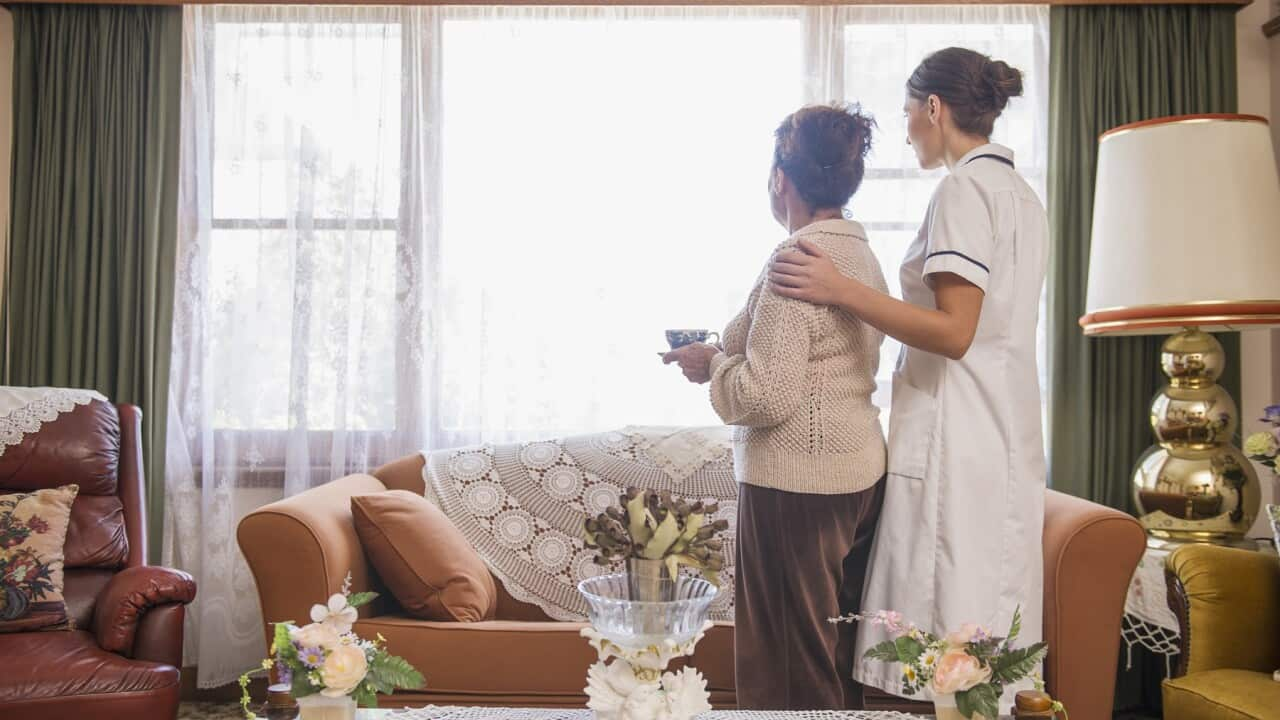Australia's aged care sector is facing a looming shortage of at least 110,000 workers over the coming decade, a new report has warned.
The economic analysis, conducted by the Committee for Economic Development of Australia (CEDA), said the shortage could increase again to 400,000 by 2050.
CEDA chief economist Jarrod Ball said the projections are conservative and outline the baseline scenario of worker shortages in aged care.
"We will need at least 17,000 more direct aged-care workers each year in the next decade just to meet basic standards of care," he said.
The think tank calculates high staff turnovers of one-in-five workers being lost is also contributing to the growing shortage.
Australia's aged care labour force has more than 360,000 people, with more than 1.3 million people accessing aged care services.
'Start pulling on every lever'
The report recommends an increase in wages to at least match those in disability and health, meaning at least a 25 to 30 per cent boost in the award wage.
It also recommends other measures to incentivise workers to enter and stay in the sector, such as the option to work sufficient hours in one job, instead of spreading work across two jobs; and career development pathways to allow for the wage to increase with experience.
By 2031, nearly 20 per cent of the population is expected to be over the age of 65, up from around 16 per cent currently.
Mr Ball said there is an urgent need to start recruitment now to avoid the current labour force shortage from growing further.
"We currently have closed borders. So we need start pulling on every lever possible - and start the work now to ensure that we are in a strong position at the end of the decade," he said.
Pandemic adds workforce pressures
There are also additional demands to grow the workforce to meet the requirement introduced by the federal government in its 2021-22 budget based on recommendations from the aged care royal commission.
The minimum number of minutes for each residential aged care resident per day is to be increased by 20 minutes to 200 minutes.
The aged care royal commission found that an increase in quality of care based on minutes per day allocated to each resident would require at least a 20 per cent increase in staffing levels for residential care.
Sydney-based aged care provider Eremea provides home care packages to help migrants through staff who are bilingual and from culturally diverse backgrounds.
Michelle Piccolo, leader of strategy and business transformation at Eremea, said the business has been impacted by staff shortages, particularly during the pandemic.
"We are definitely noticing that shortage due to the pandemic," she told SBS News.
"As a multicultural aged care provider, we represent a lot of different cultures and languages in our community and the pandemic has really cut off that normal channel for new employees coming into Australia."
'Reflection of our clients'
Ninety-per cent of the staff at Eremea are migrants, which Ms Piccolo says is out of necessity.
"We always saw that channel (recruiting migrants as staff), from a migrant perspective, always being a necessary part of our business."
Recruiting has been tougher during the pandemic with the border closures, forcing the business to search harder to find staff.
"The demand for our services is growing. We have to find other talent in our community because we have clients from diverse backgrounds.
"We are a reflection of our clients. We are really excited about that. I have never worked in a workplace as diverse in so many ways as Eremea.
"The cross-cultural thing of breaking down stereotypes is part of the value."
She concedes the lack of career progression pathways does make it harder to incentivise workers to stay in the sector long-term.
"People don't see caring as a career. Given that it is the fastest growing and biggest sector, and will continue to be up until 2050, I think we need to get serious about developing pathways for people... so that they can have the same career opportunities in the sector as they do in the others."
'Important role for migration'
Mr Ball said migration pathways to address the labour shortages also needs to be part of the solution.
"We can't see any way that you can fill that gap without a continuing and important role for migration," he told SBS News.
"Over a third of workers in the sector currently are migrants. And we do see that you will need to strategically target more workers into the sector, using the skilled migration program."
A skills shortage of 53 per cent in residential facilities and 42 per cent in home care settings, particularly in regional and rural Australia, was reported in 2016.
The, conducted by the federal Department of Health, also found 25 per cent of operators had vacancies for personal-care assistants and nurses.
The federal government provided 98.5 per cent of the government funding for aged care services in 2019-20, amounting to .
In its 2021-22 budget, the federal government included a funding increase of $17.7 billion over four years to implement the aged care royal commission findings.
The federal government has the responsibility for the regulation and policy oversight of aged care services under the Aged Care Act 1997.






